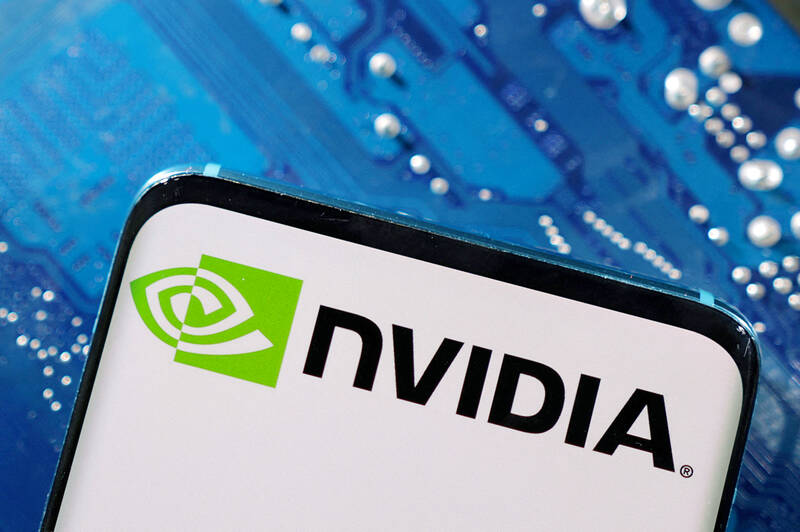Nvidia Corp’s forecast for surging revenue surprised even the most bullish analysts on Wall Street, propelling the chipmaker to the cusp of a US$1 trillion market capitalization and igniting a global jump in stocks linked to artificial intelligence (AI).
The Santa Clara, California-based company gained as much as 29 percent in extended US trading, on course for a record high, after saying it expects sales to reach about US$11 billion in the three months ending July.
That gain puts Nvidia on track also to rack up the biggest one-day valuation jump in US company history.

Photo: Reuters
Nvidia, the biggest supplier of the advanced chips required to train a new generation of AI services, inflamed already lofty expectations for a burgeoning technology.
Its rival chipmaker Advanced Micro Devices Inc jumped 10 percent, while its chip supplier, Taiwan Semiconductor Manufacturing Co (TSMC, 台積電), rose as much as 3.8 percent in Taipei and equipment supplier Advantest Corp surged as much as 20 percent to an all-time high in Tokyo.
ASML Holding NV, which supplies gear to TSMC, gained more than US$6 billion in early trading in Europe. Along with memorychip maker SK Hynix Inc, they collectively gained more than US$260 billion of value in a market otherwise preoccupied with concerns about the US debt limit and China’s economic slowdown.
Investors this year have doubled down on wagers that the viral success of OpenAI’s ChatGPT and other bots would usher in a new era of spending on the technology that underpins AI.
Nvidia’s chips excel at parallel processing, making them well-suited for training software by bombarding it with data.
The market exuberance drove home growing anticipation around the advent of next-generation AI, which executives around the world have variously likened to the emergence of the Internet and the iPhone.
Under chief executive officer and cofounder Jensen Huang (黃仁勳), Nvidia has positioned itself as the top provider of components for training AI software. That has helped it weather a broader slowdown in technology spending.
Investors were looking to Nvidia for evidence that the surge in interest in AI this year is resulting in higher sales of chips that provide the computing power.
The semiconductor manufacturer delivered that with a revenue forecast for the current quarter that dwarfed the average analyst estimate.
“The transformational surge in AI spending is paying off much earlier than expected,” Morgan Stanley analyst Joseph Moore wrote in a note.
“We simply have no historical precedent for the magnitude of this step function,” he said.
Huang said that the use of the technology is only in its infancy and more tailored products for specific industries are needed.
He has built online services and software tools to help encourage the broader adoption of AI outside of his big customers — cloud providers such as Microsoft Corp and Amazon.com Inc’s Amazon Web Services.
“Truly spectacular orders coming through for NVDA’s A100 and H100 AI chips,” said Amir Anvarzadeh, a strategist at Asymmetric Advisors Ltd in Singapore.
“More importantly for Asian equity investors, they point out that all the orders are being passed on to TSMC,” which has “more than adequate” capacity to fill the orders, Anvazadeh said.

The US dollar was trading at NT$29.7 at 10am today on the Taipei Foreign Exchange, as the New Taiwan dollar gained NT$1.364 from the previous close last week. The NT dollar continued to rise today, after surging 3.07 percent on Friday. After opening at NT$30.91, the NT dollar gained more than NT$1 in just 15 minutes, briefly passing the NT$30 mark. Before the US Department of the Treasury's semi-annual currency report came out, expectations that the NT dollar would keep rising were already building. The NT dollar on Friday closed at NT$31.064, up by NT$0.953 — a 3.07 percent single-day gain. Today,

‘SHORT TERM’: The local currency would likely remain strong in the near term, driven by anticipated US trade pressure, capital inflows and expectations of a US Fed rate cut The US dollar is expected to fall below NT$30 in the near term, as traders anticipate increased pressure from Washington for Taiwan to allow the New Taiwan dollar to appreciate, Cathay United Bank (國泰世華銀行) chief economist Lin Chi-chao (林啟超) said. Following a sharp drop in the greenback against the NT dollar on Friday, Lin told the Central News Agency that the local currency is likely to remain strong in the short term, driven in part by market psychology surrounding anticipated US policy pressure. On Friday, the US dollar fell NT$0.953, or 3.07 percent, closing at NT$31.064 — its lowest level since Jan.

The New Taiwan dollar and Taiwanese stocks surged on signs that trade tensions between the world’s top two economies might start easing and as US tech earnings boosted the outlook of the nation’s semiconductor exports. The NT dollar strengthened as much as 3.8 percent versus the US dollar to 30.815, the biggest intraday gain since January 2011, closing at NT$31.064. The benchmark TAIEX jumped 2.73 percent to outperform the region’s equity gauges. Outlook for global trade improved after China said it is assessing possible trade talks with the US, providing a boost for the nation’s currency and shares. As the NT dollar

The Financial Supervisory Commission (FSC) yesterday met with some of the nation’s largest insurance companies as a skyrocketing New Taiwan dollar piles pressure on their hundreds of billions of dollars in US bond investments. The commission has asked some life insurance firms, among the biggest Asian holders of US debt, to discuss how the rapidly strengthening NT dollar has impacted their operations, people familiar with the matter said. The meeting took place as the NT dollar jumped as much as 5 percent yesterday, its biggest intraday gain in more than three decades. The local currency surged as exporters rushed to